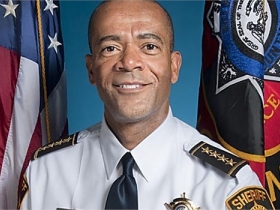Too Many Cops in Milwaukee County?
The high cost of a huge sheriff’s budget and 19 local police departments.
Insiders have long wondered what exactly the Milwaukee County sheriffs do that costs so much money. The budget for the sheriff’s department is $122 million, a cost equal to 44 percent of the county property tax levy. And how much law enforcement do we get for this?

Sheriff David A. Clarke
The most recent state Office of Justice Assistance report covers the two-year period of 2009-2010 and shows there were 106,936 violent and property crimes in the county. The Milwaukee Police Department handled 75 percent of those incidents. The sheriffs handled just 57 crimes, or less than one-fifth of one-percent.
Despite that puny effort, the sheriff’s budget is about half the size of the Milwaukee Police Dept. budget of $237 million.
Last year, the administration of Milwaukee County Executive Chris Abele released some eyebrow-raising statistics on the Sheriff’s Department, noting that:
- Milwaukee is the state’s only county with no unincorporated area, meaning there are municipal police patrolling every part of the county. Besides Milwaukee, there are 18 suburban police forces in action.
- In 2009, the sheriff reported only 19 crimes to the FBI, compared to 41,375 for the Milwaukee police, 3,288 for West Allis police, 1,908 for Wauwatosa and even 242 for the UW-Milwaukee police. That’s right, the UWM campus police handled 12 times more criminals than the Sheriff’s Department.
- Just 10 percent of Sheriff David Clarke’s requested property tax levy was for police services. As Abele put it, “the sheriff plays only a limited role as a traditional law enforcement agency.”
The deputy sheriffs staff the Milwaukee County Jail and County Correctional Facility South (formerly House of Correction), handle the courthouse’s system of bailiffs, and patrol the freeways. These are important functions. But important enough to justify a $122 million budget?
These questions predate the tenure of David Clarke. But there’s no evidence he’s done anything to realize budgetary efficiencies. As Abele noted last year, the Sheriff Department’s budget had risen 61 percent over the last decade, far faster than any other county department. It was something of a sacred cow under former county exec Scott Walker, rising steadily while the parks budget stayed flat at 0 percent and county transit declined by 8 percent.
I can’t recall any county executive ever raising systematic questions about the sheriff’s budget. Abele concluded that Milwaukee County has 30 percent more law enforcement employees than comparable counties, according to the Uniform Crime Reports. If true, this would suggest taxpayers are overpaying for police.
I expected to find data on spending on police by suburban governments from the Public Policy Forum, which tracks municipal spending. But here again it seems local police budgets are sacred cows. The group’s director Rob Henken says it hasn’t tracked this because there’s been no interest. “We have focused on fire departments mainly because that’s where we have seen some interest from mayors and village presidents (in consolidation),” Henken says. “We do hope to get to police, but the politics are very fierce, and we are trying to concentrate on consolidation opportunities that might get done in the relatively near future.”
There’s no doubt a lot is being spent on police in the suburbs. Checking some of the bigger municipalities, the annual budget for police is $14.9 million in Wauwatosa, $11.6 million in West Allis, $8.8 million in Greenfield, and about $8.3 million in both Franklin and Oak Creek. The 18 suburbs combined probably pay more than $100 million for police services.
In response to relatively modest cuts in his budget last year, Clarke went to war against Abele, blasting him every chance he had, and refusing to offer any ways to trim his budget. He claimed public safety would be sacrificed because of the cuts to his budget, singling out safety on the buses, and claiming he had 25 officers patrolling the buses and parks.
But the county transit system released data suggesting the deputy sheriffs did very little patrol of the buses. The statistics showed that the private security firm, G4S (which has just 20 officers patrolling the buses) handled 2,000 incidents per year, compared to just 150 incidents by deputy sheriffs. Either Clarke was exaggerating the number of deputies patrolling the buses or he was assigning them in a very inefficient manner.
This year, in another budget-cutting move, Abele cut a deal with Mayor Tom Barrett to have the Milwaukee Police Dept. patrol the parks and complete the department’s takeover of the 911 phone call system. (The latter had been handled by the sheriff’s department, but since most of the calls were for city problems, it makes more sense for the city to maintain the system). Under the deal, the city would get $1.7 million from the county, mostly to pay for the police patrol, and the 18 suburban governments would split $125,000 to handle park patrol in their municipalities. The Sheriff’s budget would be cut by $3.3 million. Abele and Barrett say the parks can be more efficiently patrolled by the city police, thereby saving money for both the county and city.
You might have expected suburban governments to fight the idea of ending the patrol of their parks by deputy sheriffs, but there hasn’t been one word of protest, probably because little patrol was actually being done.
“In West Milwaukee we typically respond to all the calls in the parks,” says that city’s police chief Dennis Nasci. “I’m not aware the sheriffs do.”
In Franklin, Inspector Gaylord Hahn says “I don’t see them (deputy sheriffs) here very often. We patrol the parks. And we’ve probably got some of the biggest parks in terms of total park land.”
Abele’s spokesperson Brendan Conway says Clarke’s budget shows he is devoting little attention to the parks. During the first 32 weeks of this year, the data shows, just 32 percent of deputy sheriffs assigned to the parks actually patrolled them.
Clarke’s responses to the Abele/Barrett plan have been mostly petulant. He has threatened to reassign deputy sheriffs to city neighborhoods that he claims are demanding more law enforcement. But Clarke has repeatedly claimed that Abele has left him with too little manpower, so where would these extra deputies come from?
He has also told the Milwaukee Journal Sentinel: “This is nothing more than a political attempt by these two to neutralize me, probably politically.” But Clarke already ran against Barrett in 2004 and, embarrassingly, didn’t even get through the primary. And he had an opportunity to run for the open county executive seat in 2011 and declined. Indeed, Clarke may be vulnerable to a challenger running to his right as a fiscal conservative arguing the department can be more efficiently run. The recent county audit of how he spends forfeiture money raised some questions in that regard.
The broader issue here is whether county taxpayers are paying too much for public safety. Two things might help settle that question. A thorough county audit of the entire Sheriff’s department might shed some light on whether it could be more efficiently run. An examination of the relative costs of having the state patrol handle the freeways versus the deputy sheriffs should be part of the audit (after all, that’s how interstate highway patrol is handled in most counties). Secondly, some foundation should consider paying for the Public Policy Forum to study the suburban police departments and the potential for consolidation of any operations between suburbs, or in conjunction with the sheriff’s department. The taxpayers deserve some real answers to these questions.
Short Takes
-In response to my story on the Journal Sentinel’s reporting of a questionable survey supposedly showing small businesses are hurting, Bruce Thompson offers a comment noting that the monthly surveys of the National Federation of Independent Businesses (which co-funded the report the JS touted) show its members are doing far better than four years ago.
-And Dave Steele offers an interesting column on the impact of voucher schools.

















Isn’t each county in WI required by state law to have an elected county sheriff? I thought I read that somewhere…meaning the state could prevent the county from eliminating the sheriff’s position completely. If state law requires a sheriff, does it state what the sheriff’s responsibilities are? Jurisdiction could be limited to running the jail and the courthouse, and possibly the freeways, with the rest of the county’s law enforcement handled by each municipality. I’m guessing the state won’t chip in for additional State Patrol coverage, since the state is broke and all.
It will be interesting to see how Sheriff Clarke responds to this. I have no opinion on whether the sheriffs budget is too high or not. However, Clarke has a long history of responding to criticism with adolescent name calling and vitriol rather than facts. I think he has become an embarassment to Milwaukee County.
There have actually been some moves by small communities outstate to eliminate police departments and pay the county sheriffs to patrol (mostly due to very low crime rates and the desire for 24/7 coverage, which requires quite a large force per capita). A large reduction in sheriff department spending seems appropriate, if the county is 30% overstaffed compared to “like” communities, if there is such a thing. The study is advisable, and it’s time to get rid of Clarke. Unfortunately, he is elected. We need someone progressive and responsive to budgetary issues to legally change their name to Andy Griffith, and run, and reform this department. He is unresponsive to the needs of the community, for starters. His staffing decisions seem based on bravado, just the opposite of what law enforcement needs. But, Abele and the County Board can start cutting more now.
Sounds like we could transfer the vast unneeded MKE Sheriff’s Dept $ to the much-in-need MKE County Parks $. In investment in Parks, especially our central city parks, would be a great way to reduce youth-related crime, in particular. Do it, County Exec Abele!
We need more guys like Clarke and less like those in the Milwaukee City hall that have refused to police the inner city properly for years.
If the liberals who have run Milwaukee for over 100 years could get their education system to teach kids how to read and bring in some jobs we would not need so many cops. they are far more interested in getting the teachers campaign money and help then they are in educating kids. why the parents do not revolt is beyond me. We had some crap like that in Tosa and we threw them all out.
This city is a poster child for the failure of liberalism and it’s governing of this state and the 10 other cities who are going the way of Detroit in this country.
@Wis. Conservative Digest Just so I understand this right, we need guys who have dramatically increased his budget (until finally being stopped), and still have very few arrests to show for it?
The sheriff’s job is not police work, look at the job description.
@Wis. Conservative Digest Then there should be no problem with deputies no longer policing, err patrolling, the parks in Milwaukee.
The sheriff’s job is to patrol freeways and most other programs of that type.
He is not crime fighter per se.
From watching the people that run Milwaukee the last 50 years, we would be better off dissolving the police in Milwaukee and putting Clarke in charge.
“He is not crime fighter per se.” apparently not… Sounds like it is a good plan then to have the department that does policing, do policing.
Milwaukee County is the only one in the state that patrols the interstate highways within its borders. There has been discussion for many years centering on having the State Patrol cover the Milwaukee County interstate roadways. It needs to be done.
The excess staff in the sheriff’s department allows Clarke to make strictly political decisions like sending deputies to provide security at Republican events but not Democratic events, not even those involving the President.
And, all that excess in his budget, allows Clarke to order dozens of custom made uniforms for himself to wear when he’s out putting on his dog and pony show.
It is cheaper for the sheriffs to patrol, that is why we haven’t had a change. The constitution provides that we shall have a sheriff.
Prove to me it’s cheaper, an anonymous opinion doesn’t carry any weight. Just because the office of sheriff is required, doesn’t mean the duties and responsibility can’t be changed.
Constitutional amendment, go ahead. Research it yourself.
As I said, prove it’s cheaper or do you admit it’s an ignorant comment?
What purpose are you trying to affect by making Sheriff Clarks skin lighter than it really is?
“It is cheaper for the sheriffs to patrol, that is why we haven’t had a change. The constitution provides that we shall have a sheriff.” Pure B.S. No fact.